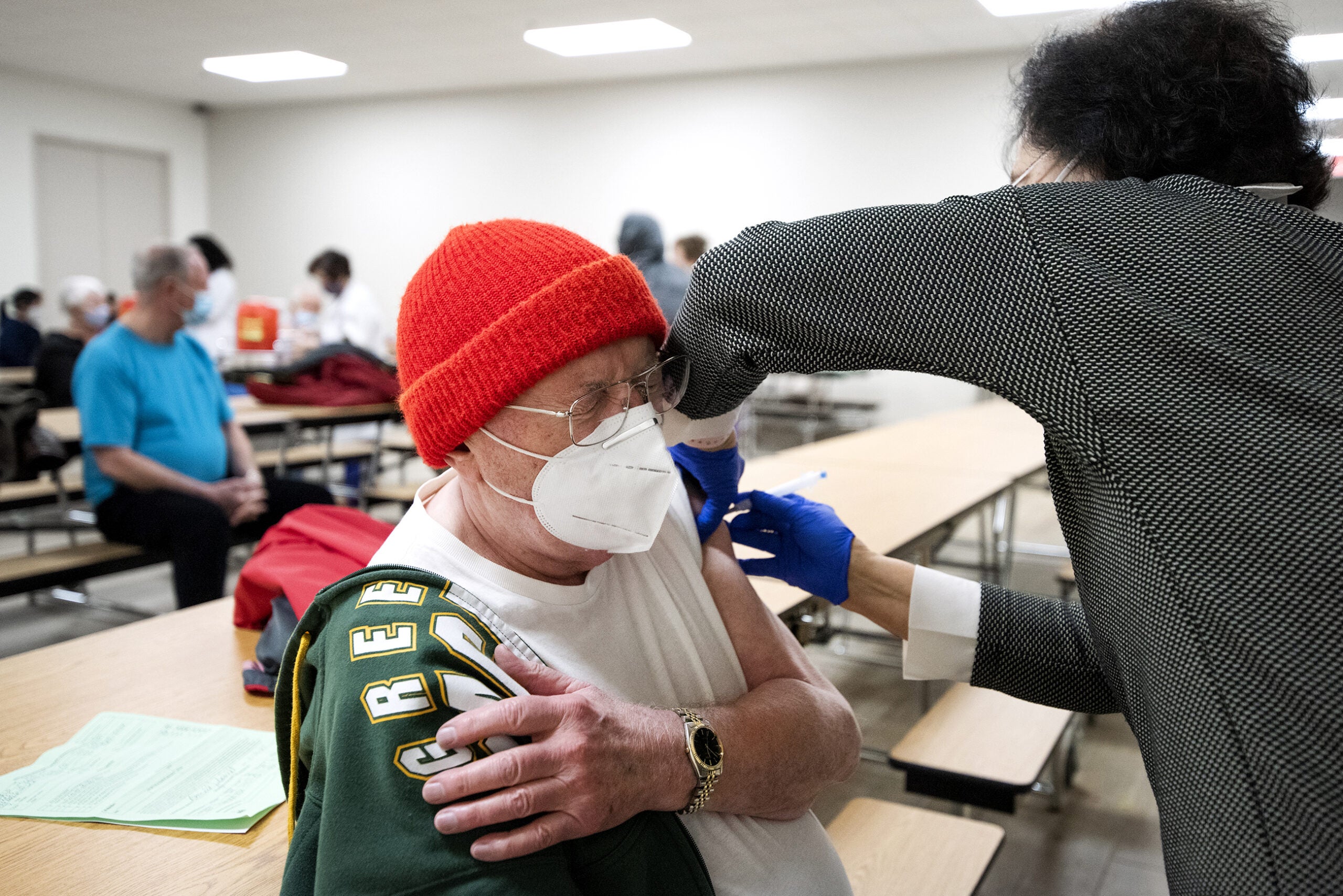Three months after the first doses of COVID-19 vaccine were injected into the arms of frontline health care workers, the largest priority group — those with underlying health conditions — will soon get their turn.
State health officials announced Thursday that Wisconsinites between the ages of 16 and 64 will be eligible to get vaccinated beginning March 29 if they have health conditions that put that them at higher risk of getting severely ill or dying from COVID-19. This group is more than 2 million people, officials said, making up more than 60 percent of the state’s population.
By expanding eligibility, state leaders and health officials hope to build on momentum that has resulted in more than 11 percent of the population being fully immunized.
News with a little more humanity
WPR’s “Wisconsin Today” newsletter keeps you connected to the state you love without feeling overwhelmed. No paywall. No agenda. No corporate filter.
“This is incredible progress made possible thanks to our network of vaccinators and the increased vaccine supply we know is on the way from the federal government,” state Department of Health Services Deputy Secretary Julie Willems Van Dijk said during a virtual press briefing.
State officials have faced criticism for not making people with pre-existing conditions eligible sooner, as other states have done. Wyoming, for example, allowed people with chronic medical conditions to be vaccinated against COVID-19 starting Feb. 1.
On March 8, Iowa opened up vaccinations for those ages 64 and younger with certain medical conditions. According to the Kaiser Family Foundation, just over half the United States currently prioritizes those with medical conditions.
As of Thursday, more than 1.8 million doses of the coronavirus vaccine had been administered in Wisconsin — with 64.8 percent of Wisconsinites age 65 and up being fully vaccinated.
Those already eligible for vaccine in Wisconsin under Phase 1a and 1b are people over 65, teachers, child care workers and essential workers such as public transit drivers, agricultural employees and grocery store clerks. Frontline health care personnel, residents in skilled nursing and long-term care facilities, police and fire personnel and correctional staff are also eligible.
Those with chronic medical conditions are in Phase 1c. DHS has determined 20 health conditions that qualify a person to be eligible for the vaccine. This includes obese and overweight individuals. According to state data, 67 percent of Wisconsin residents are in this category.
Willems Van Dijk said Thursday that proof of chronic illness will not be required.
“We are not asking people to verify, we are not asking people to have to bring their medical record and prove that they have asthma or diabetes,” Willems Van Djik said. “This is not about policing this, this is about creating entry into the vaccine system for people who have these conditions.”
The state’s decision was supported by recommendations from the Centers for Disease Control and Prevention.
Those With Chronic Conditions See Reason For Optimism
The new guidelines open eligibility to more than 2 million Wisconsinites, Willems Van Dijk said Thursday.
The state’s announcement comes less than two weeks after Wisconsinites younger than 65 with chronic health conditions expressed frustration that they had not been prioritized, despite their serious risk of complications if they got sick. On Thursday, some of those in that group received the news as a relief, even though questions remain about the logistics of the next phase.
Sherie Kristie, of Hudson, is 61, with pulmonary fibrosis that has reduced her lung capacity by 30 percent. She said she hopes providers follow the state’s advice and give priority to those at highest risk. Otherwise, she fears a scramble among the large group of people who will be newly eligible on March 29.
“I feel like I’m going into Walmart on Black Friday to fight my fellow man to grab one of those few big-screen TVs,” Kristie said. “And I’ve never shopped on Black Friday because the whole thing was so damn ugly. In this case, it’s life and death, and I’m just going to do my best to compete.”
Willems Van Dijk said the state’s supply of vaccines is expected to ramp up considerably by the end of the month, and new mass vaccination sites in several cities around the state will also help to meet the increased demand.
Bruce Nerge, of Janesville, is 64, with Type 2 diabetes, emphysema and other conditions that he said qualify him for eligibility in the next group several times over. He’s said the news left him hopeful that he’ll see his grandchildren relatively soon.
“I talk to them on the phone,” he said. “They always say, ‘Grandpa, when are you coming over?’ And I say, ‘Well, when I get the vaccine I’ll come over.’ I’m looking forward to being able to see them.”
Based on the recent and anticipated increases in vaccine availability, DHS predicts the general public will be eligible for the vaccine sometime in May.
Case Numbers Steady Across State
The news of expanded vaccine eligibility comes as COVID-19 cases in the state hold steady. DHS reported 502 new cases of the disease Thursday, bringing the average for the past seven days to 363 daily cases. One week ago, the average was 522 daily cases.
There were 3,693 negative tests reported Thursday, and no new deaths from COVID-19.
Other DHS data from Thursday include:
- 568,352 total cases of COVID-19 since the pandemic began.
- 6,524 people in Wisconsin have died from COVID-19 to date.
- 3,227,003 total tests administered, 2,658,651 of which have been negative since the pandemic began.
- 26,670 people have been hospitalized because of the disease, or 4.7 percent of all positive cases, since the pandemic began.
- Daily testing capacity remains at 59,273, though only 4,195 new test results were reported Thursday.
Editor’s note: Rob Mentzer and Rich Kremer contributed reporting.






